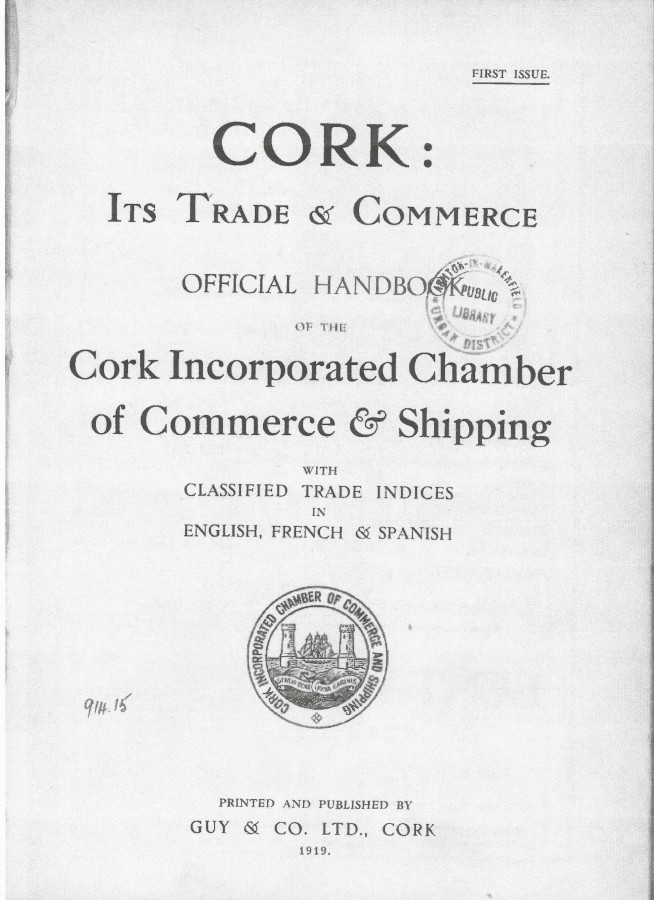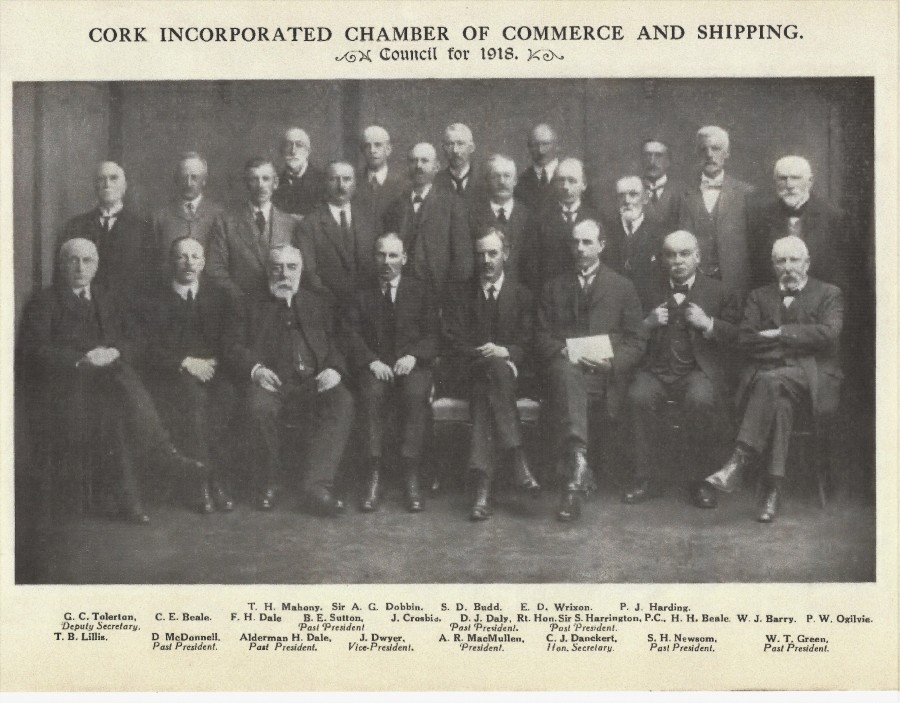
Kieran’s Our City, Our Town Article,
Cork Independent, 4 April 2019
Tales from 1919: A Commercial Handbook
Cork: Its Trade and Commerce was the official handbook of the Cork Incorporated Chamber of Commerce and Shipping and was published by Guy & Co. in early April 1919. It was edited and compiled by D J Coakley, then Principal of Cork Municipal School of Commerce. It is available in local studies in Cork City Library.
One hundred years ago, the first edition of the Commercial Handbook, aspired to show in a concise form “the commercial and industrial facilities – which the City and surrounding districts offered, to focus attention on our Commerce and Industry, and to give reliable information to those seeking locations. for new works or the extension of existing ones”. By means of this guide the Chamber had for the first time a complete and accurate survey of the past history and present position of the commerce and industries of Cork, as well as a valuable critique into their future possibilities. The Trade Index was in English, French, and Spanish, and the book was liberally illustrated throughout. Copies were distributed in the United Kingdom, the Colonies, the Continent, and America.
Established in 1819 Cork Chamber of Commerce has consistently led a mission to be the leading business organisation in the Cork region. For two hundred years, it has committed itself to ensure the city and region’s prosperity, vibrancy and competitiveness through sustainable development. Researching the history of the institution through the rich archival material that has survived, every broad period of growth and decline has empowered the institution to carry on to challenge and resolve the issues of the day. The contribution has been immense. Established in an economic decline and as a champion of Catholic Emancipation, the Chamber emerged not only to provide a physical space where its members could come and read the up todate news of the day and plan for the future, but also to challenge the status quo. It grew rapidly from 1819 to the Great Famine years campaigning for more rights for the Catholic merchant middle class and more investment opportunities.
Post the Irish Great Famine, the economic decline that followed led to the emergence of new forms of party politics being connected with the Chamber. The quest for Home Rule and the Irish National Land League campaign split the membership in the 1880s with the Incorporated Chamber of Commerce and Shipping appearing on the commercial landscape of the city. The city now had two chambers that pursed issues such as the need for better and quicker transport modes and more business education. Both of these core issues led the Chambers to the era of the First World War, where once again economic decline ensued. There was a distinct shortage of labour as many Irish labourers went out to fight the war.
In 1916, regular commentary is given in the minute books of both chambers to the arrival and potential of the Ford company in Cork. The choosing of Cork was deemed important to be a calling card to attract future private investment. In November 1916, Fords made an offer to purchase the freehold of the Cork Park Grounds and considerable land adjoining the river near the Marina. Fords, Cork Corporation and the Harbour Commissioners entered into formal negotiations with the Chambers of Commerce as key supporters.
During and up to the early years of the twentieth century the two chambers campaigned for berths to be deepened at low water to keep all shipping afloat at lowest tides. Wharves and deep-water quays were built and berths were deepened. In 1919 the Cork Harbour Commissioners acquired from the Board of Trade 153 acres of slobland at Tivoli for the purpose of pumping dredged material ashore, thus creating new land for industrial purposes. This happened over several decades.
Across the newspapers of Spring and Autumn 1918, references are regularly made of subscriptions being made to the Cork Sailors’ Widows and Orphans Fund. It was established to consider the impact on families who lost their breadwinners on torpedoed vessels and to relieve a large number of cases of distress among deserving widows and orphans. Ninety-six lives were lost on the six Cork steamers and applications for relief from the fund were received for 95 households.
A sub-committee of key merchants in the city was set up on 5 April 1918 and by late September it had held ten meetings. The committee was championed by Bishop Daniel Cohalan of Cork, Bishop Charles Cork of Cork, Cloyne and Ross, Lord Mayor T C Butterfield, A R MacMullen, President of the Cork Incorporated Chamber of Commerce and Shipping, Ebenezer Pike. Pike was Chairman of the City of Cork Steam Packet Company. Other members of the Incorporated Chamber were also involved, Sir Stanley Harrington, Samuel H Newsom and Thomas Barry Lillis, General Manager of Munster and Leinster Bank.
The social and political unrest of the Irish War of Independence, which characterised the year 1920, was referred to in the 1921 Chamber report. Large areas were cut off from communication with Cork by rail owing to-the shutting down of portions of the railway system, by the military, authorities during the early part of the year, and. through the closing down of the Cork and Bandon, and Cork and Macroom systems, owing to strike, towards the close of the year. In June, the Cork, Blackrock and Passage Railway was closed by the military, and was shut down nearly four weeks. In the months and years that followed the Burning of Cork in 1920 both the Incorporated and general Chamber advocated for timely reconstruction on St Patrick’s Street, cheaper rates to alleviate business and appropriate re-valuations of property for businesses, who rebuilt their premises and trade.
Kieran is also showcasing some of the older column series on the River Lee on his heritage facebook page at the moment, Cork Our City, Our Town.
Kieran’s Lifelong Learning Festival Week
Sunday 7 April, The City Workhouse, historical walking tour with Kieran; meet just inside the gates of St Finbarr’s Hospital, Douglas Road, 2.30pm (free, duration: two hours, on site tour).
Sunday 14 April, Stories from Cork Docklands, historical walking tour with Cllr Kieran McCarthy, meet at Kennedy Park, Victoria Road 2.30pm (free, duration, two hours, finishes nearby).
Captions:
991a. Front cover page of Cork: Its Trade and Commerce, published April 1919 (source: Cork City Library).
991b. Council, Cork Incorporated Chamber of Commerce, 1918 as published in Cork: Its Trade and Commerce, 1919 (source: Cork City Library).
